SAFETY
CONFINED SPACES IN THE WINE INDUSTRY
The publication of Italian Presidential Decree No. 177 of 14th September 2011, which lays down rules for qualifying companies and self-employed professionals operating in spaces that are confined or suspected to be polluted, raised particular attention in the wine industry. Baukos, which has been operating in the wine industry for years and specializes in applying protective coatings to the internal surface of wine containers, tanks, pressure tanks, etc., was able to adapt quickly to Italian Legislative Decree No. 81 of 9th April 2008 and Presidential Decree No. 177 of 14th September 2011 by implementing proper work organization and adopting suitable tools and equipment.
The expression 'confined space' refers to a space that is totally or partially confined and that has not been designed and built to be, nor is intended to be, permanently occupied by persons but may occasionally be temporarily occupied by persons for the execution of inspection, maintenance, repair or cleaning works or for the installation of technological devices. Confined spaces are spaces with limited entry and unfavourable natural ventilation, whereby the risk of death or serious injury is very high because of the presence of dangerous substances, chemical agents, or hazardous conditions (for example lack of oxygen). Confined spaces, which are easily identifiable because of the presence of limited or restricted means of entry, include tanks and vessels, silos, sewer systems, etc.
Art. 2 of Presidential Decree No. 177 of 14th September 2011 on the qualification of companies and self-employed professionals operating in spaces that are confined or suspected to be polluted, states that:
1. Any work in spaces that are confined or suspected to be polluted can only be performed by qualified companies or self-employed professionals that meet the following requirements: a)
strict application of current norms on risk assessment, health surveillance and emergency management measures;
b) full, mandatory application of Section 21(2) of Legislative Decree
No. 81 of 9th April 2008, in the case of family businesses and self-employed professionals;
c) presence of personnel, amounting to no less than 30% of the total workforce, having
at least three years' experience of working in spaces that are confined or suspected to be polluted, and hired under an open-ended employment contract or other contracts or
subcontracting arrangements, in the latter case provided their contracts have been previously certified according to Section VIII, Par. I of Legislative Decree No 276 of 10th September
2003.
Workers performing supervision tasks must necessarily have this experience; (omissis).
2.2. Work within spaces that are confined or suspected to be polluted may not be carried out by subcontracted workers, unless expressly authorised by the contractor and certified in compliance with Section VIII, Par. I of Legislative Decree No 276 of 10th September 2003, as amended. The provisions of this regulation also apply to companies and self-employed professionals to whom the works are subcontracted.
Baukos employs permanent personnel.
Most members of our staff have ten years' experience in applying resin coatings inside wine tanks and vessels.
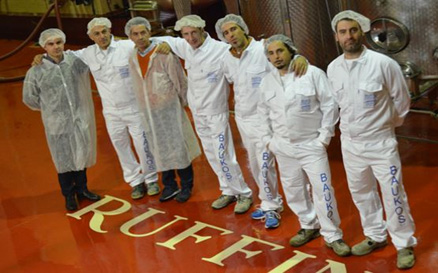
Legislative Decree No. 81 of 9th April 2008, Sections 66, 121 and annex 4. 3.1
Pipes, ducts and containers, such as vats, tanks and similar vessels that workers need to enter for inspection, repair or maintenance purposes, or for any other reason connected with the operation of systems or equipment, must feature openings used as access doors of suitable dimensions to allow easy recovery of any unconscious casualty.
Considering that one of the indications for identifying a space that is confined or suspected to be polluted is the presence of “limited access or egress routes”, the following conditions certainly apply in the wine industry:
- openings with a diameter of less than 60 cm;
- difficulty of access by persons wearing self-contained breathing apparatus or other rescue devices;
- difficulty in recovering
a worker who has fallen to the ground and is in a knee-chest position;
- passage through the access/exit route is made difficult by the presence of pipes.
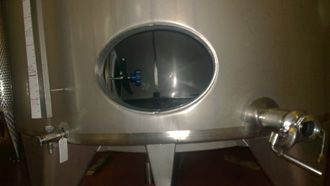
BAUKOS offers valid alternative solutions:
extremely small access openings (maximum width less than 400 mm) should preferably be replaced with larger ones. In the case of wider access openings (400 mm or more) Baukos can adopt
systems that enable the easy recovery of casualties.
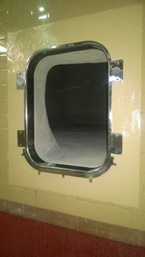
Tank entrance
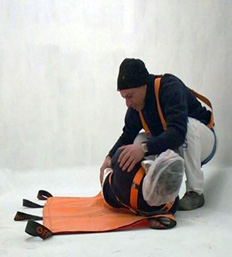
Rescue simulation
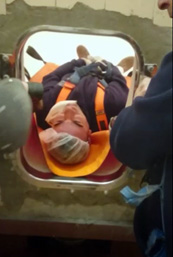
Rescue simulation
Pursuant to Italian Legislative Decree 81/2008, the following sanctions are envisaged for the end client, principal, contractor and subcontractors:
- - Imprisonment for a term of two to four months or a fine from 1,000 to 4,800 Euros (infringement of Sect. 26 (1) of Legislative Decree 81/2008),
- - Imprisonment for a term of three to six months or a fine from 2,500 to 6,400 Euros (infringement of Sect. 17(1)(a) of Legislative Decree 81/2008),
- - Fine from 2,000 to 4,000 Euros (infringement of Sect. 18(1)(p) of Legislative Decree 81/2008),
- - Fine from 2,000 to 4,000 Euros (infringement of Sect. 18(1)(g) of Legislative Decree 81/2008),
- - Imprisonment for a term of two to four months or a fine from 1,500 to 6,000 Euros (infringement of Sect. 18(1)(d) of Legislative Decree 81/2008),
- - Imprisonment for a term of two to four months or a fine from 1,200 to 5,200 Euros (infringement of Sect. 36, 37)


